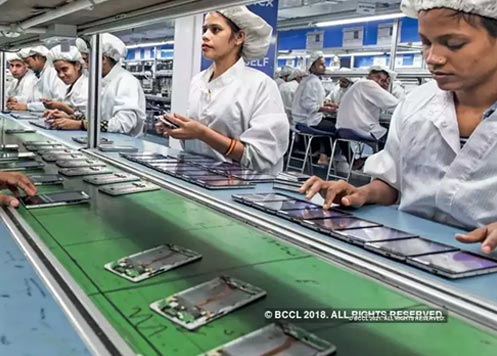Women in manufacturing: How companies are driving mammoth change

According to Anya Geraldine D’souza, GM - Global Marketing, ELGi Equipments, several barriers make women feel the manufacturing industry is 'not for them'. “However, women must look beyond the general perceptions and rid themselves of the misconceptions that bear no semblance to the modern, innovative, technically advanced manufacturing operations of today,” she said.
Even as the employment of women in the formal sector has witnessed a downward trend in recent years, top manufacturing companies are going out of their way to attract women staff and ensure their upskilling through special initiatives.
The long-term strategy of many companies in the manufacturing sector is to hire more women and empower them. Many manufacturing firms and corporate leaders are taking steps to ensure equity, diversity and inclusiveness.
Manufacturing players doing their part
Electronics manufacturing services company Syrma Technology has trained over 1,800 women employees across all locations.
“On an average, we train for over 5,000 manhours per month for skilling up the people through our SDC/OJT (skill development centre / on the job training) or e-modules — 1,00,000 manhours per year for all employees for both technical and soft skills. We have transformed our SDC into a government-authorized training centre to widen our scope of training, techniques and methodologies,” said Sreeram Srinivasan, CEO, Syrma Technology.
Similarly, Schwing Stetter, a pioneer in manufacturing equipment for concrete preparation, employs diploma engineers, both men and women, to work on the shop floor and various other manufacturing activities at the recently inaugurated Global Manufacturing Hub in Cheyyar.
“The mission of Schwing Stetter India is to make the DETs (Diploma Engineer Trainees) to learn while earning, and elevate them to the Graduate Engineers level in a five-year period, enabling them to emerge as a better professional in their career and also allowing them to explore the possibility of better opportunities outside the organisation,” said VG Sakthikumar, Managing Director, Schwing Stetter India.
The company has recruited 18 women in the first batch and they are currently undergoing skilling at the facility.
Inspiring the future
Global air compressor manufacturer ELGi recognized the wide gap in gender balance and to address this, its vocational training school conducts a three-year programme post which the graduates join the manufacturing facilities on the shop floor.
“The programme identifies talented youngsters from challenging backgrounds and aims to mould them for future success while equipping them with the skills required to build a fulfilling career. The current batch has over 50 per cent women in the class and we're excited about being able to build diversity right at the very start of the talent pipeline,” said Anya Geraldine D’souza, General Manager - Global Marketing, ELGi Equipments.
Today, with a workforce of 1,800 employees, ELGi has women working in every function — both white and blue-collar — human resources, supply chain management, IT, technology, finance, marketing, sales, and other support functions with a current distribution of about 30 per cent in sales, marketing and support; 18 per cent in finance and HR; and 14 per cent in technology.
“We've been purposeful about a clearly defined, gender-diverse recruiting strategy ensuring every job posting is inclusive, while showcasing our company culture. ELGi’s #InspireTheFuture programme also aims to celebrate and showcase stories of our women who are succeeding across all levels in our organisation,” D’souza said.
Syrma, by identifying and training traditional skills of women from rural communities has improved its production capabilities to a great extent. Syrma’s skill training program focuses on bringing the traditional skills of rural women to the assembly line. The company believes making effective use of their critical native skills can give the EMS industry a big boost for talent.
Srinivasan said critical native skills of women in Tamil Nadu are finger dexterity and good hand-eye coordination. “These are innate and can be traced to our unique lifestyles and cultural upbringing where hand and finger skills are encouraged and groomed from a young age,” he said.
“We provide special training programmes, designed for women employees, in our Skill Development Centre, on safety & health, leadership development, quality improvement, and other technical training like soldering or stuffing techniques, etc,” Srinivasan added.
Need of all-inclusive environment
Since the manufacturing industry has fewer women workforce participation, industry leaders suggest creating an all-inclusive environment to welcome female workers.
According to D’souza, several barriers make women feel the manufacturing industry is certainly 'not for them'. Ranging from discomfort with entering the male-dominated workplaces, societal expectations regarding gender roles for men and women, a perception that a job in manufacturing will be a monotonous assembly-line task or work that is dirty or dangerous, amidst infrastructure that is not women-friendly are some of the reasons she cited.
“However, women must look beyond the general perceptions and rid themselves of the misconceptions that bear no semblance to the modern, innovative, technically advanced manufacturing operations of today,” she asserted.
Schwing Stetter has taken a step forward by facilitating policies for its women workforce on the production shop floor at its Cheyyar Global Manufacturing Hub, such as dwelling to be provided nearby the production bases for the families of married employees and all-women hostel for the unmarried employees.
The women workforce at the company gets recognition based on their performance, sans gender basis. The company has also taken initiatives for the higher technical education of its women employees.
Syrma Technology has a total staff strength of 2,500 employees, out of which about 85 per cent are women. The company has helped its women employees define clear career pathways through its ‘Grow from within’ initiatives and identifying people into emerging leaders groups and focus groups for fast-tracking women leaders.
Speaking of the gender pay gap, Srinivasan from Syrma Technology said, “We don’t face that issue since we employ a significant women workforce. Pay is equal for both male and female employees in our organisation, without any gender discrimination across all levels.”
READ MORE
